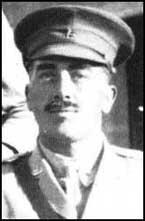Arnold Ward

Arnold Ward, the son of Thomas Humphry Ward, a fellow at Brasenose College, and the successful novelist, Mary Humphry Ward was born in 1876. He was educated at Eton and although he did well academically he was involved in a scandal when as treasurer of the school cricket team, he misappropriated its funds.
At Balliol College, Oxford University, Ward won a double first. This was followed by a spell as special correspondent for The Times. He went to Egypt but his parents refused permission for him to go to South Africa during the Boer War. Instead he went to India where he journeyed the length of the North West Frontier.
Ward passed his law exams in 1903 and for the next few years worked as a lawyer in Birmingham and Nottingham. In the 1906 General Election, Ward was the Conservative Party candidate at Wiltshire North but was easily beaten by the Liberal candidate. However, in the 1910 General Election he successfully won Watford.
Ward's mother, Mary Humphry Ward, was president of the Anti-Suffrage League and editor of the Anti-Suffrage Review. In the House of Commons Ward played a prominent role in the campaign against granting women the vote. Even during the First World War, when other leading campaigners such as Lord Cromer and Lord Curzon had withdrawn their objections, Ward continued to vote against giving women the franchise.
On the outbreak of the First World War Ward joined the British Army. He was sent to Egypt but after getting into trouble for gambling and drinking was sent home to England in disgrace. Ward's parents attempted to use their influence with the High Command to get him a Foreign Office appointment in Athens. However, when it was discovered that Ward had heavy gambling debts, he was rejected.
Fran Abrams the author of Freedom's Cause: Lives of the Suffragettes (2003) pointed out: "News had already reached the family in England that Arnold had got himself into trouble in Cairo, where he was stationed, by running up gambling debts. The amount was around £6,000, and Mary agreed to pay it in installments of £500 every six months. There were only two possible means of finding such a huge sum - sell Stocks House, or hold on to it but sell off its contents to survive and pay the bills. Mary and Humphry, believing they would not live long, chose the latter option. Although Mary's wartime work, England's Effort, was a success she knew she could no longer rely on her novels to make her the kind of money she now needed to earn. It was a depressing end to a glorious career."
In the 1918 General Election, the Conservative Party in Watford decided to select another candidate for the constituency. Ward's debts were now considerable and on the death of Mary Humphry Ward in 1920, the family home, Stocks House at Aldbury in Hertfordshire, had to be sold-off to pay his creditors.
Arnold Ward died on 1st January, 1950.
Primary Sources
(1) Fran Abrams, Freedom's Cause: Lives of the Suffragettes (2003)
News had already reached the family in England that Arnold had got himself into trouble in Cairo, where he was stationed, by running up gambling debts. The amount was around £6,000, and Mary agreed to pay it in installments of £500 every six months. There were only two possible means of finding such a huge sum - sell Stocks House, or hold on to it but sell off its contents to survive and pay the bills. Mary and Humphry, believing they would not live long, chose the latter option. Although Mary's wartime work, England's Effort, was a success she knew she could no longer rely on her novels to make her the kind of money she now needed to earn. It was a depressing end to a glorious career.
